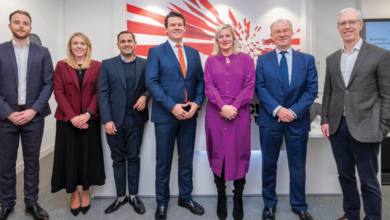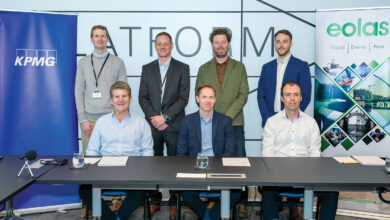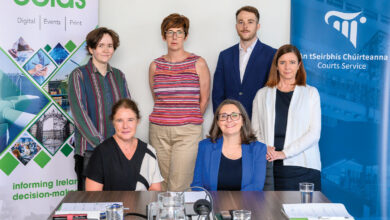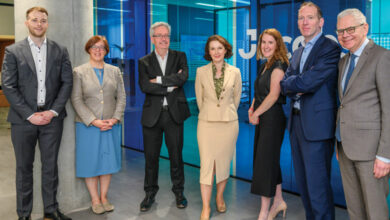Accelerating the digital transformation of public services

Dell Technologies hosted a virtual round table discussion with key stakeholders from across the public sector, utilising their expertise to explore the potential for accelerating digital transformation in Ireland’s public services.
What are your organisation’s specific priorities in relation to digital change?
Mary O’Connor
Over the summer and on the back of our Covid response, we took stock and decided to really bring our focus towards accelerating digital across all parts of ESB Group. Seven initiatives were identified. One common theme across all business units is the area of digital employees and smart working, which is obviously topical at the minute. In our shared services, the emphasis is on is automation, self-service and paperless. ESB Networks decided on three areas for their transformation: the first is customer experience, making that as good as possible; the second is employee experience; and the third is active system management to enable decarbonisation and the management of electricity to enable customer access to decarbonisation. In ESB’s customer solutions business, the focus is on customer experience regardless of the service being offered and in generation and trading, data, AI and analytics to improve margins are the priorities.
Paul Duffy
Enterprise Shared Services promotes and enables digital transformation across central government in Northern Ireland. There has been quite a bit of progress in recent years taking a digital first approach to designing access to public services. However, the landscape has obviously changed over the last six months, as have priorities. When you look at pace of change in the past, this needs to be accelerated, exploring and optimising initiatives such as data analytics and AI. The programme I’m leading on at the moment is about moving shared services towards an integrated cloud solution and what this has really highlighted for us is the need to look at our current operating model and how it has evolved with the pandemic, linking into the need to look at our digital workplace and mobility. We have been very much a desktop organisation and have had to change to laptops and a range of collaboration tools to allow staff to work remotely. We now need to understand what our future operating model is going to look like and how we begin to embed these new ways of working.
George Maybury
Dell Technologies is currently upskilling 800 of its staff through postgraduate diplomas in digital transformation including the newly created TRANSFORM programme. The new course is designed to help our team better understand how technologies like Artificial Intelligence, Virtual Reality, Robotics, Internet of Things (IoT), Data Science, Cloud and Blockchain can be leveraged to shape the future of work and accelerate digital transformation. At a management and leadership level, we’re looking at digital transformation in terms of persuasion and the ability to convince people that this is the future of our business. Our investment, which has been significant, is making sure that people are thinking in the right way going forward. As a data-driven organisation Dell Technologies has insights on every asset that we operate. Getting insights from that data means we get value from it and that is a huge priority for us going forward this links in with our 2030 Progress Made Real goals to advance sustainability and reduce CO2 emissions, which is a priority for us and our customers.
Tony Shannon
In terms of where the Government is with regard to digital change, things that were brewing before Covid have been accelerated. What we’re trying to do is focus on building back better and offering a set of citizen-centred services that are much more integrated. Gov.ie, which is our main landing page for information has seen a huge uptake and we expect it to be the landing page for further services. MyGovID is a programme that is already in flight and we’re keen to support its rollout further. That brings us to issues like digital credentials and there are some EU trust regulations (eIDAS) there. Aside from those, there’s the Digital Postbox and the MyData portal, alongside work around electronic forms that will enable ‘paperless’, and e-case management so that the citizen-facing digital services can be met by staff-facing digital services on the other side.
Tim Willoughby
The first thing is that digital policing is information led policing. In the modern world, this is about adapting agile technologies and data use. My role is to reimagine the organisation through the frontline, which leads to persona building, hackathons and trying to reduce paper by building end-to-end solutions with our cross government partners rather than just solving our own problems. In policing, security is a huge element, so security by design is underpinning everything that we do. There’s a huge emphasis on data and embedding a data culture, because improved data quality is essential for digitisation. With Covid, we have to drive collaboration and remote working. Part of our mobility project has been the roll out of more mobile devices and using them as desktops. Using virtual server technology, our call centre people around the country are able to run all of their desktop services off their phones. Working with our partners in the OGCIO and others is hugely important and we are adopting things like cloud and open source. The key for us is a balanced catalogue of our existing systems and managing those. It’s great to have new things but you have to bring the old stuff with you.
How has the Covid-19 pandemic accelerated the shift to digital?
Tony Shannon
You won’t be surprised to hear that Gov.ie has jumped from six million visits last year to 80 million views this year already. There has been a massive shift in citizens seeking information from government and a requirement therefore that government departments respond very quickly. That happened within days and weeks. Allied to this, a shift to remote working has upended organisations including the Civil Service which is now facilitating working from home in way that could never have been imagined this time last year. That change is here to stay. Likewise, the Pandemic Unemployment Payment and the Temporary Wage Subsidy Scheme were digital solutions that were implemented within days. From my perspective, as someone with a health background, I was proud to see the speed of rollout for the Covid Tracker app, utilising user centred design, agile development and open-source software to deliver within months. These are rapid transformations that we had not seen before Covid-19.
One of the positive things that has come out of the Covid-19 pandemic is that it has demonstrated what can be done at a much more agile pace.
— Paul Duffy, Strategic Programme Director for the Central Government Transformation Programme
Paul Duffy
One of the positive things that has come out of the Covid-19 pandemic is that it has demonstrated what can be done at a much more agile pace. On occasion, the public sector has been criticised for not moving at a quick enough pace and I think that the recent experience has shown what can be achieved. Certainly in Northern Ireland, a number of new developments and grant schemes have been put in place to support individuals and businesses in a matter of weeks, all of which are digitally accessible. The turnaround and response has been phenomenal. If we were in a business-as-usual scenario, it would be many months before such initiatives were developed and launched. Obviously, the move to a digital workplace has also been accelerated, certainly within the Northern Ireland Civil Service, and we need to build on this progression and loss the benefits.
Tim Willoughby
During the pandemic, many people have matured in their approach to cloud. Previously, there was a potential reticence around cloud solutions in the public sector. Now, however, even our conversation today is cloud-based and a significant number of people have migrated to cloud-based unified communications platforms. Different organisations have adopted different solutions and the range of cloud tools we now use throughout the working day is broad. Everyone has had to become a cloud expert. A substantial volume of the work my team is undertaking concerns user design; working with people on the frontline to understand their adoption of tools before then tailoring them to work better.
Mary O’Connor
It all resonates with me in terms of our experience and changed behaviour among both customers and employees. It really is a significant change. Literally overnight, ESB shifted from having less than 400 people with the ability to work from home to having over 4,000 working from home. It was a smooth transition with everyone retaining access to their applications and utilising videoconferencing for meetings. Previously, the pursuit of such transformational change would have required months or even years. The challenge now is to take this energy, focus and attitude to change and capitalise on the momentum we now have, rather than sliding back into our normal way of operating and of implementing change.
Looking beyond 2020 to 2025, I think the pace of change is going to further accelerate as there is a shift to processing data at the edge due to the arrival of 5G and other low-cost next generation wireless technologies.
— George Maybury, Public Sector Director, Dell Technologies
George Maybury
Tim mentioned reimagining the whole end-to-end process and that is the essence of disruption. This means thinking about a new operating model as opposed to simply digitising an old one. As we’ve seen over recent months, organisations have been using technology to totally transform their operating models and how they engage with service users. Personally, in my all-island remit, a significant portion of my working week was spent travelling across the country for meetings. Reflecting on that, much of the time was spent in the car and was therefore non-productive. Within Dell Technologies, we have sought to reimagine work. We’re now looking at the opportunity to simultaneously retain our hubs in Belfast, Dublin, Cork and Limerick while also accessing new talent pools that are being unlocked with the move to remote working. With work no longer a place but what you do, we can enhance diversity at Dell Technologies and bring new experiences and backgrounds to the team. The challenge is sustaining the momentum achieved over recent months.
What are the most significant challenges to fundamental digital transformation within the public sector?
Tim Willoughby
One of the big challenges is inertia. Covid has been one of the things that has helped us move away from that. We used an awful lot of paper, which has served us well, but the challenge for people innovating within their four walls is in getting end-to-end set of solutions where problems are solved together rather than paper firing back and forth. As part of the Innovation Week, we did an end-to-end hackathon with the entire justice sector, taking a whole series of scenarios that are mostly paperbound to find different ways of doing things. Using the agile methodologies and showing people a potentially better route is the biggest thing for me, solving problems across the sectors.
The challenge now is to take this energy, focus and attitude to change and capitalise on the momentum we now have, rather than sliding back into our normal way of operating and of implementing change.
— Mary O’Connor, Chief Information Officer, ESB
Mary O’Connor
There are two significant challenges to this at a high level. One is the need to recognise that it’s a leadership challenge ahead of a technology challenge. Of course, technology is absolutely central to the change, but I think recognising that it’s first and foremost about changing leadership culture is important. The second big challenge is the modernisation of technology. Some of our technology has been around a long time and we need to modernise that and open our systems of record so that they be used in a digital way – that can be a big challenge. We need to recognise the investments needed and build them into the propositions.
Paul Duffy
One challenge particularly affecting the public sector in Northern Ireland is collaborating across organisations. We have to harness digital capability rather than working in siloed departments and sectors. There is a role for digital leaders, certainly in central government, health and education sectors, and local government, to find better ways to collaborate for the benefit of citizens. Citizens don’t care whether they access a service through department X or department Y and rightly so, it’s an easily accessible service that matters. The other area that Covid-19 has also shone a light on is our own internal capacity and capability. We need to build and enhance our digital skills within the public sector to deliver more efficient services. To date, we have relied very heavily on our partner community to deliver that change and now we need a greater emphasis on training our own people. The final area is not a new challenge, it’s around funding. Given the amount of money expended in responding to the pandemic, we will be operating in a constrained financial environment for some time and therefore we need to consider how best we sustain digital change to drive benefits and value for money for citizens.
George Maybury
There are two significant challenges. From a leadership perspective, how do we convince our people that the change is necessary and will provide a better experience going forward? Some of the best ideas will come from the coalface and we must have leadership to enable people to think digitally and reimagine processes. While I work in the private sector, I understand the silo mentalities which can exist between government departments. Simultaneously, often the appetite for risk is diminished by a fear of making a mistake. This is a bigger challenge in the public sector where you are audited and subject to other checks and balances that could suppress an innovative culture due to a fear of making a mistake.
To what extent is digital transformation about making a cultural leap?
Mary O’Connor
One of the big challenges is that when we talk about digital programmes and digital within an organisation, people automatically assume it’s all about data and technology. In reality, it’s primarily about a different way of working and cultivating a different mindset. Concepts like customer experience, employee experience, design thinking and working with initiative can be very new for people. Getting staff comfortable with those and recognising their value is important. As George referenced, there should be an emphasis on leadership and the ability to persuade others. As much as possible, we need to leave behind the big business cases and projects, instead pursuing more iterative change with focus on experience more than processes. Digital transformation is about convincing people of the value of that change and showing them a new way of working rather than fixating on the technology.
Paul Duffy
I always find the phrase ‘digital transformation’ interesting because its scope and meaning is interpreted in many different ways. Within central government in Northern Ireland, I don’t think that we have really embraced or exploited digital transformation to its full extent. We have certainly made significant steps in digitalising many of our services, having them put online and introducing mobile technology to make them more efficient. There are pockets of innovation, but the level of disruption that is required to truly transform services has not been exploited. That takes courage and a willingness to take risk, and accept a degree of failure. Unfortunately we tend to talk about “digital” transformation, which automatically prompts you to think about the technology solution, rather than the business change which may, or may not, be enabled through technology.
Tim Willoughby
We’ve adopted a principle of ‘love the problem, not the solution’. That means addressing the problem we’re trying to solve. It’s about examining the organisation through the lens of the 14,000 Garda Members on the frontline rather than focusing on how IT delivers its service. We’re slowly changing the culture by enabling members to utilise all the innovative tools from user centric design to hackathons and collaboration with other organisations. The frontline is where the major change is going to happen. There’s huge support from the leadership in terms of finance and support of the whole innovation process.
If you look at the wicked challenges that we now face, be it Covid-19 or climate change, we are being propelled into an era of major change whether we like it or not.
— Tony Shannon, Head of Digital Services, Office of Government Chief Information Officer
Tony Shannon
The public sector has had a reputed culture of working in silos and resistance to change. It may have got us this far, but if you look at the wicked challenges that we now face, be it Covid-19 or climate change, we are being propelled into an era of major change whether we like it or not. This will demand major change programmes on a scale and complexity that has never been confronted before. That’s going to demand cultural change, particularly from our people, and we’ll have to react with positive disruption. Some of the solutions that have already been mentioned, including a more agile approach and an open approach to the data and technology involved are culturally challenging for a sector that is known for being conservative and tied to waterfall style rollouts of proprietary technology. Now, we’re being shaken out of that comfort zone because we know that it hasn’t delivered well enough for the public sector and particularly for the citizens we serve.
George Maybury
Large organisations have a tendency to look internally at times. That is natural, whether it’s from the perspective of BT, Dell Technologies, An Garda Síochána or ESB. The challenge for me is to put Dell Technologies in the shoes of its customers or service providers to solve their problems. By doing that, it’s possible to change mindsets. For instance, from Dell Technologies’ perspective, we are investing our time developing a growth mindset and changing how we think rather than on the technology we sell. Leadership has an important role in facilitating this. Since first rolling out our Connected Workplace Programme in 2009, remote working has become standard practice for our team members with our senior leaders, including Michael Dell, driving a change in how we view work; it is what you do and not a place you go.
Hypothetically, if there was one initiative you could immediately implement with regard to digital transformation, what would it be and why?
Mary O’Connor
If I had a magic wand, I would wave it over ESB and make it so that everybody completely understands what digital means in terms of alternative ways of working and for them to be completely bought into that. I’d like to disrupt routines, challenge people and cultivate enthusiasm for the level of change ahead. I’d like people to see the potential and be eager for digital transformation.
Paul Duffy
I am quite conflicted on this issue because as a former finance director, my natural instinct is for robust checks and balances and governance arrangements, however the delivery of technology solutions is more agile and delivered at pace, which conflicts with the governance and controls that have been in place for traditional ways of delivery. We are using agile methodologies and approaches for digital development which is also challenging our risk appetite and our willingness and acceptance of failure as a possible outcome. I would like to see our governance align better with new ways of delivery so ultimately we get a better outcome for citizens.
We’ve adopted a principle of ‘love the problem, not the solution’. That means addressing the problem we’re trying to solve. It’s about examining the organisation through the lens of the 14,000 Garda Members on the frontline rather than focusing on how IT delivers its service.
— Tim Willoughby, Head of Digital Services and Innovation in An Garda Síochána
Tim Willoughby
From an external point of view, it would be fantastic if the National Broadband Plan was finished. We have 565 Garda stations, not all of them in the main cities, some of them are at the very edge of the country and we’ve had to use smart technology to get them connected. I want every Garda to have the same opportunity to connect in the same way. We also need a much greater appreciation for what open source and open data can do for us. A new area that we’re working on with some colleagues is inner source, so we can share policing-sourced material with other countries behind our firewalls. It is slightly different from the open source sharing of the Irish Covid app, but demonstrates the power of different thinking coming together and adopting processes from others can move us way above where we are now.
Tony Shannon
If I was to pick one it would be trying to improve digital services by using the advantage of the Data Sharing and Governance Act that we now have to implement. We have a view that if we can get the Civil Service and public bodies to think about this the right way to make citizens’ lives better and make sure the data sharing and governance is done better, then they can be more encouraged to work across boundaries and provide joined-up government that will make people’s lives better. I think if we can get our focus on that across government, it will really help.
George Maybury
Looking beyond 2020 to 2025, I think the pace of change is going to further accelerate as there is a shift to processing data at the edge due to the arrival of 5G and other low-cost next generation wireless technologies. Gartner predicts that, by 2025, 75 per cent of enterprise data will be created and processed at the edge outside of traditional data centres or clouds. That’s an increase of 10 per cent on 2018. Personally, I’m very excited about this for industries such as healthcare where monitoring devices such as glucose monitors, health tools and other sensors are either not currently connected, or where they are, large volumes of unprocessed data from devices are stored on a third-party cloud. This may present security concerns for healthcare providers. An edge on the hospital site could process data locally to maintain data privacy. Edge also enables right-time notifications to practitioners of unusual patient trends or behaviours, through analytics and AI, and the creation of 360-degree view patient dashboards for full visibility.
Round table participants
Paul Duffy
Paul Duffy was appointed the Strategic Programme Director for the Central Government Transformation Programme (CGTP) in May 2020. Paul was previously the Chief Executive of the Driver and Vehicle Agency in the North and was responsible for the delivery of a wide range of front line services, including driver and commercial licensing; driver and vehicle testing; and regulating the transport industry. Prior to this, Paul was the Finance Director in the former Department of the Environment. Paul is a qualified accountant and graduated from the Major Projects Leadership Academy at the Saïd Oxford Business School in 2015.
George Maybury
George Maybury leads the Public Sector business for Dell Technologies across Ireland. His team provides all of Dell Technologies’ services and solutions to education, healthcare, local and national government as well as defence and security. Previous to this, George led BT’s government business in Northern Ireland and was responsible for a number of large scale digital transformation programmes. George holds a degree in management and information systems and a postgraduate diploma in IT for strategic management from the Technological University of Dublin. In his spare time he is an underage football and hurling coach for his local GAA club St Brigid’s.
Mary O’Connor
As CIO of ESB, Mary O’Connor is responsible for driving digital transformation for the entire organisation as well as overseeing cyber strategy and risk management, IT strategy and Enterprise Architecture. Mary has a wealth of experience from over 30 years working in a wide range of disciplines and functions at all levels within ESB. Mary is an IT graduate of Trinity College Dublin and is an ACCA post-graduate in accounting and finance. She is a coach and mentor within ESB and is passionate about developing people to enable them reach their full potential.
Tony Shannon
Appointed in September 2020, Tony Shannon is Head of Digital Services, Office of Government Chief Information Officer, Department of Public Expenditure and Reform. Over the last 20 years, he has been involved in a range of change/digital programmes and projects at local, regional, national and international levels, initially in healthcare, then local government and now in government. Previously, Tony trained and worked in emergency medicine and informatics between Ireland, UK and the US, having qualified in medicine at University College Dublin. Tony’s interests include change, complex systems, societal and economic wellbeing, leadership, service improvement, information technology.
Tim Willoughby
Tim is Head of Digital Services and Innovation with An Garda Síochána and is responsible for the Technical Operations, Garda Networks and the Garda Mobility Programme. Tim was formerly CTO of the LGMA, having spent over 20 years in a number of senior management and technical roles in the local government sector. He has been working in the public service for almost 30 years. Tim has a civil engineering degree from Trinity College Dublin and a master’s in innovation from Ulster University. Tim is a Fellow of the Irish Computer Society and was awarded ICT person of the year in 2018.






